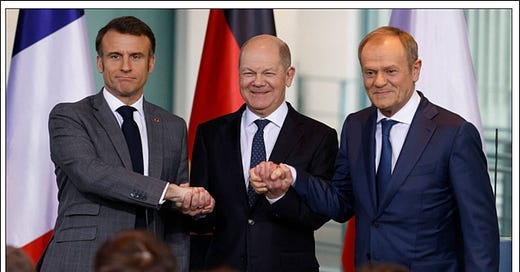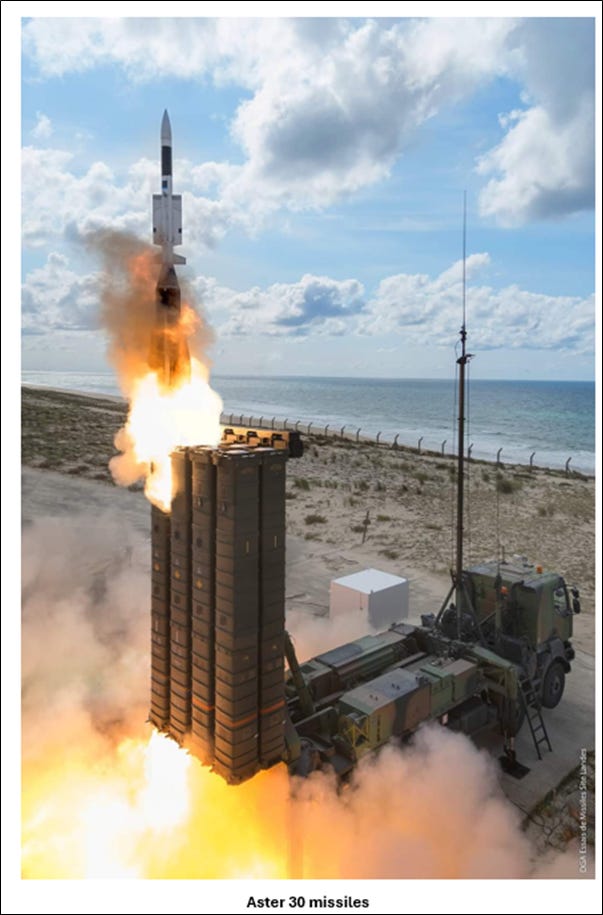Birth Of Something New?: NATO Evolving Into Trans-National Dominion
Founding goal is to provide consistent, constant aid for Ukraine
NATO is taking two steps forward, and in the process seems to be transforming its nation-state members into a joint governance structure for action and results.
Its first step forward has been taken because NATO members are frustrated at the sporadic nature of voluntary payments to support Ukraine against Putin’s invasion.
NATO Foreign Ministers are meeting in Brussels to ensure reliable and predictable security assistance to Ukraine for the long haul.
NATO wants to rely less on voluntary contributions and more on NATO commitments; less on short-term offers and more on multi-year pledges, according to NATO Secretary General Jens Stoltenberg.
The proposal by Stoltenberg is for a 100 billion euro ($108bn) five-year fund for Ukraine.
NATO Allies now provide 99 percent of all military support to Ukraine.
Stoltenberg’s resolution is clear: “We are transforming NATO’s comprehensive assistance package into a multi-year programme of assistance. We are helping Ukraine move closer to NATO, with NATO standards on everything from procurement to logistics. And we are supporting Ukraine’s reform efforts to bring Ukraine ever closer to the Alliance.
“Ukraine will become a member of NATO. It is a question of when, not if.”
He added that a record number of Allies will rise to meet NATO’s two percent of GDP spending target this year.
So: nice work, Putin. You have not only united NATO, added new members, upped their defence spending, and focused their outrage, but you have pushed them to establishing a new permanent fund to defeat the Russian armies.
In this process a new animal is emerging: a creature fed by constant supplies of funds and dedicated to continuing the life of each member, united.
Five out of five.
The NATO package will be decided in a meeting in July.
Second, NATO is edging away from American dominance.
Once the clear brain-child of Washington, NATO has been watching with horror the American political struggle to help Ukraine. Perhaps a joint thought flashed through the minds of 31 out of 32 NATO members that their security is too importance to be left in the hands of a political system where power resides in the vote of states that consist of three men and a blind dog.
So with a wary eye on Washington, the new NATO plan would hand over coordination work from a United States-led coalition known as the Ramstein group. This will help guard against any cut in US support if Donald Trump returns to the White House; Trump is not a supporter of NATO.
The Europeans are also more aggressive than the Americans – a total turn-around in the space of a few years.
It has not escaped the notice of most NATO members, for example, that threats by Putin that he would regard NATO initiatives as escalation, have not in fact led to any retaliatory action against them.
Putin, in a word, is full of it.
The only person he seems to have flustered is Biden, who has asked Ukraine to stop bombing Russian oil refineries. A headline from The Hill said it best: “Biden inexplicably urges Ukraine not to be so effective fighting against Russia”.
Biden was warning that the drone strikes risk driving up global oil prices and provoking retaliation. The way it came out sounds like Biden is more concerned about keeping global and domestic oil prices below $85 in an election year than he is about stopping Russian oil revenues.
Ukraine has thus far destroyed some 12% of Russia’s oil refinery capacity.
The drone attacks are reaching farther and farther into Russia. A 1300-km strike just hit Russia's third-largest oil refinery. It processes about 155,000 barrels of crude per day; the damage was not said to be critical. This time. Now, we are guaranteed that there will be a next time. The damaged unit accounts for around a half of the plant's total annual production capacity - about 6.2% of Russia's refining capacity. 20 more drones should end Russian oil production.
Biden is missing a big political opportunity to let Ukraine finish the job, while taking justified credit for encouraging the American shift to electric vehicles.
Fortunately for the cause of freedom, it seems that Ukraine is ignoring him and paying attention to the President Zelensky, who said: “"Equally important is that the Russian terrorists are receiving responses to their strikes. Each time, longer-range responses."
Realistically in their contest against NATO, Russia has no hope of carrying out military action against the world’s largest military alliance. Nuclear strikes are not on the table, as this kind of weapon has never been used in a situation where both sides could hit back. Hitler never used massed poison gas aerial bombing - a nuclear equivalent in its day – because the Brits also had poison gas…and Churchill was itching for an excuse to use it.
Ukraine has been attacked by more than 4,600 Russian long-range Shahed drones during the war. But Ukraine is specializing in the “asymmetrical” drone warfare, using cheap drones to destroy large expensive Russian targets. Just the other day news emerged showing a rare glimpse of unmanned systems fighting each other on the battlefield. Ukrainian first-person view, or FPV, drones carried explosives that destroyed two of Russia's "ground robot platforms". They descended near the robots and blew up. Drone-on-drone combat is sure to increase.
Another reason that European nations are bringing the focus of the alliance to European shores is the increased role that Europe is playing in the defence of Ukraine.
France for example has just announced the supply of hundreds of armored vehicles to Ukraine, in addition to Aster 30 anti-missile systems.
French President Macron has also suggested that French troops might be sent to Ukraine. While the main NATO countries did not immediately accept the idea, the Baltic countries were enthused. Poland is coming around to the idea. “It is about Putin being afraid, not us being afraid of Putin," said Foreign Minister Radosław Sikorski.
His Lithuanian counterpart Gabrielius Landsbergis echoed the thought: "There cannot be any 'buts.' We must draw red lines for Russia, not ourselves. No form of support for Ukraine can be excluded.”
Macron has moved the boundaries of support for Ukraine. An op-ed in Le Monde by Pierre Schill, the French chief of army staff, titled “The French army is ready”, claiming that France “has the capacity to commit one division, i.e. around 20,000 men, to a coalition within 30 days.” Paris, he added, would be able to command a force of around 60,000 soldiers made up of French and other allied troops.
Unlike in the US, the government in Paris dismissed the resistance of the far-right and far-left opposition, noting that they have no impact on decision-making.
Macron called for a “strategic leap” in thinking about Putin’s war.
In parallel, across the pond, US Congressional representatives will come together again on Monday April 8th – the day of the big solar eclipse…surely a coincidence and not a sign from the gods – to decide on a military aid package.
The stumbling block has been the Republican resistance to providing President Biden with another policy win during an election build-up. Trump has been pulling back on the coat-tails of radical followers to prevent a package from passing.
His efforts are being over-ridden by public pressure and the insistence of many Republicans that the Ukraine should be supported.
Nebraska Republican congressman Don Bacon for example has helped to draft a compromise aid package that provides for $66bn in military aid to Ukraine, Israel and Taiwan.
Right now, his plans are set to take flight, as it looks like US House speaker, Mike Johnson, has raised expectations that a vote on funding for Ukraine could be imminent in the chamber.
He risks losing his leadership position if his party votes him out because of the aid proposal. Georgia congresswoman Marjorie Taylor Greene has already filed a motion to remove him, but she stopped short of putting it out for a vote. Some Democrats have indicated they would support Johnson if a vote to remove him were called.
Greene herself has stated that her motion is “more of a warning than a pink slip” to Johnson, but added that the “clock has started” against the speaker. She indicated that if things don’t change he could face a removal vote from her “in two weeks” or a “month.”
Bacon appeared to scoff at this. Without identifying Greene by name, he stated: “We have one or two people that are not team players. They’d rather enjoy the limelight, the social media.”
Johnson tried to polish the aid apple by saying that he will propose “important innovations”. These might include lend-lease where Johnson says that “we’re not just giving foreign aid, we’re setting it up in a relationship where they can provide it back to us when the time is right.” It might also include the seizure of Russian assets, a move Johnson praised as “just pure poetry”.
The manoeuvres bring to light one unsettling feature: with only a one-vote majority in the House, the fate of the aid bill is really in Democratic hands. Biden has chosen to let Johnson be in control. He also warns Ukraine away from bombing Russian oilfields, and utters vague disapproval while Israel bombards Gaza, the Wast Bank, Lebanon and Syria.
None of these decisions is making the West any safer; in fact, they are weakening our cause.
One inference is that Biden does not have the fortitude to be decisive. Another is that he has some reason to want things to continue to wander as they currently are. Either way, it’s not bringing voters to stand beside him. He will be re-elected without doubt, but more because women want their power back after the overturning of Roe more than anything positive Biden has recently done for Ukraine.
But if things go right on the 8th, the House should finally pass the aid bill for Ukraine.
This will be a huge boost of course for the morale of the men in the trenches.
And another depressing day in Moscow.
If those two stars align – American aid and European troops on the ground in Ukraine – it should be obvious to even Putin that he has lost.
Of course, it’s hard to publicly admit defeat when you are a demi-god.
He may need some help from his friends.
He certainly has experience helping other friends admit they were wrong.
Posthumously.








Good analysis on the transformation of NATO. "Necessity is the mother of invention..." NATO was always more of a conceptual threat to Russia born out of the Cold War and not really a functional military force. After WWII the U.S. did not trust Europeans to rearm in fear they would again attack each other. They were kept neutered while the U.S. taxpayers footed the bill of defending Europe. A lot has changed in the decades following and it is time for Europe to assume responsibility for its own defense. If anything good comes out of Putin's folly it will be the forcing of Europe to "fledge" from the nest of U.S. dominance and to chart their own course in the world again. Now, the U.S. needs to make the mental transformation from being a "parent" to being a "partner" to Europe. "Shift happens..."